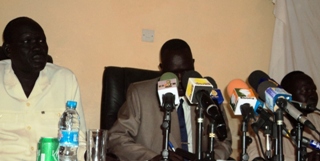South Sudan’s renegade General Athor sets conditions for his return
By Thon Philip Aleu
October 19, 2010 (JUBA) – Representatives of a dissident general from the southern army – the SPLA – said Tuesday that he would not disrupt the south’s referendum on independence in January but would not leave hiding until his demands were met.

Clashes between the SPLA and rebels loyal to Athor have killed at least 58 people since they began in May.
Representatives, claiming to be Athor’s commanders told a press conference in the south’s capital Juba the renegade general accepted the amnesty offered to him by Southern Sudan President Salva Kiir 7 October.
Despite not attending in person, Athor’s delegation, that such south-south dialogue were what they had wanted since the elections.
“This dialogue was our initiative after April elections and welcome it,” said Dok James Puok who introduced himself as external secretary for the movement.
Puok was flanked by Abraham Thon Chol and Abile Ring Majok, all commanders in Athors movement.
The SPLA have said that Athor’s militia has no more than 100 men although the remoteness his soldiers means that it hard to establish their size. Claims that some members of the SPLA defected to Athor’s group have been strongly denied by the southern government.
Athor’s representatives declined to speak in detail about their demands above the amnesty that has already been offered. They said that releasing those who had been arrested by southern authorities would be good for “confidence building”.
“We will not be obstacle to our [south Sudan’s] referendum,” Puok said.
“It’s not easy to come [back] after taking arms. You need to build confidence [first],” he said.
So far political and military attempts to curb the threat of Athor’s militia have failed. President Kiir’s pardon to Athor was also made to two other General Gatluak Gai. David Yauyau of Pibor county of Jonglei State, was also pardoned.
Gabriel Tanginyang, a militia leader formerly supported by Sudan Armed Forces in Khartoum, announced that he had joined the SPLA ahead of the Southern Political Parties Conference that ended on Sunday.
Gen. Athor has welcomed the amnesty but did not attend the five day discussion but sent 9 representatives.
Puok said Athor declared permanent cease fire around “areas liberated” by his forces.
He said that despite the clashes between his forces and the government they were one and “the same SPLM/A [Sudan People’s Liberation Movement/Army]”.
The areas Athor had “liberated” were “for those who are denied their rights [during the elections]”, said Puok.
“The guarantee is ourselves. We have come [and] there is no fear,” Puok said when questioned on Athor’s committed to achieving peace with the government of southern Sudan (GOSS) before referendum due to begin 9 January 2010.
The three men claim that David Yauyau who comes from Jonglei state like Athor and Gen. Gatluak Gai of Unity state were part of a united “zonal command.”
Athor’s team denied they had any links to the government of Sudan in Khartoum, but said “enemies of the same person can be friends.”
Khartoum regularly armed smaller southern groups to fight the SPLA during the 22 year civil war between north and south, which ended in 2005.
But Puok denied the incident proved Athor was receiving assistance from the Sudan’s ruling National Congress Party.
“We were using our own resources to hire a helicopter”, Puok said.
Abraham Thon Chol, told the press that Athor accepted the elections results but had gone to bush as he felt intimated after assuming civilian life.
“Athor congratulated the [Jonglei] governor elect and went back to his home only to be attack[ed],” Thon said. He added their forces had to act in self defense.
South Sudan is widely expected to vote for independence in January’s vote, which was agreed in the 2005 peace deal between the SPLA and NCP.
(ST)
